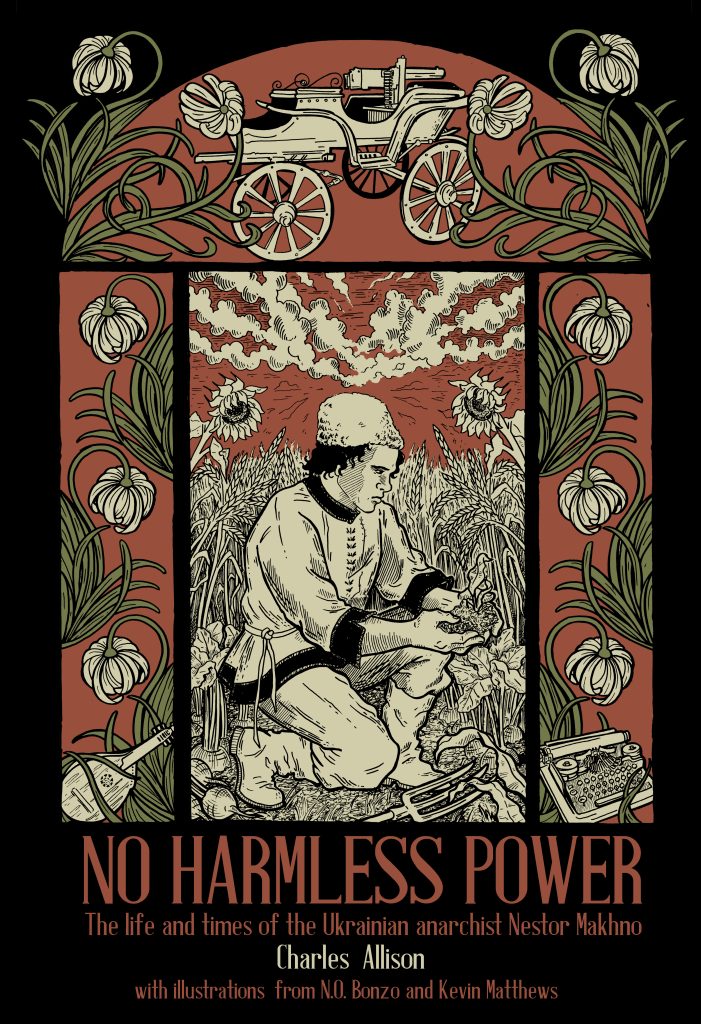By Charlie Allison
(Land And Freedom, Blue Panther Games, 2023)
(This interview has been edited for clarity and length).
Charlie: Anyway, lets talk about your work! Your game (Land and Freedom) is delightful, I can’t
shut up about it with friends and comrades. You caught lightning in a bottle here bud. Also
congratulations on its recent translation into Spanish, by the way.
Alex Knight: Yeah! A company in Spain is going to put out a Spanish language version of it,
which is really exciting. Its called NAC Wargames.
Charlie: And they approached you or you approached them? What was the process like?
Alex Knight: Yeah, they approached me on Twitter.
Charlie: I came up with a list of questions—hope you don’t mind me asking them only semi-
chronologically.
Alex Knight: No problem, I’ll answer any questions you have to ask me.
Charlie: So you and I have chatted a bit. You were active in the Occupy movement—is it fair to
draw a line between your experiences there and your development of LAND AND FREEDOM?
Did that influence, say, how you wrote the anarchist CNT-FAI faction in that game?
Alex Knight: Well, it’s a great question. Yeah, I think that not just Occupy, my background in
organizing going back to the anti-war movement in college and then being in the new SDS
(Students for a Democratic Society) really taught me what its like to be part of a movement.
You have many different ideologies competing in large movements. In any social movement,
you’re always going to be working together with people that you don’t totally align with
politically and you also need to work together. There’s that constant tension of ‘how much do
we all focus on the greater goal/good’ vs. ‘how much do we constantly get into political
maneuvering to try and push the group/movement into our direction, the direction we believe in
vs. it slipping into a different direction we don’t believe in.’ It’s a constant tension. Certainly that
played out in Occupy as well. Out of Occupy, one of the earlier prototypes that I put together in
terms of game design, was an Occupy-Wall-Street board game. It was just a prototype, it
didn’t go anywhere. It likely wasn’t that good of a game—back in 2012, 2013. But, it had some
similar DNA to Land and Freedom in terms of a semi-cooperative game where all the players
are different factions that are working as part of the movement. Everyone wants the movement
to succeed, but you all have completely different political visions for what that even means. So
you’re fighting each other at the same time to get your particular vision to be triumphant and
setting the agenda for the movement. Like I said, that game never actually went anywhere but
it lingered in my mind as a template, I guess, for what games can do. Then, when I started
working on Land and Freedom in 2018 I had that experience to draw on.
Charlie: So it was a prototype’s-prototype, the essential factors are there, in potential.
Alex Knight: Yeah.
Charlie: I know there is another game, STRIKE! that we also sell at the local infoshop.
Alex Knight: Well, there is Strike! the board game where you’re a bunch of workers doing a
general strike in a city, which is a cooperative game. Everyone is working against a sort of evil,
Amazon-esque company. Kinda a corporate dystopia sort of vibe. So Tesa Collective, who
made that game, hired me to make a card game version of Strike! Except it is set inside a
workplace. The players are all coworkers trying to organize a place to go on strike. That game
isn’t out yet, hopefully it’ll be out next year. But yeah, I did design that for Tesa collective.
Charlie: Nice! That kind of dovetails nicely into another question I had which is—I suspect I
know the answer to this—do you think that games can serve as educational tools, not in terms
of just teaching radical history or social revolution but as political and moral education?
Alex Knight: I certainly hope so. That’s obviously what I’m trying to do with my whole project
here, game-design, is to make games that inspire people to participate in social movements. At
the very least, to recognize the power of social movements as a transformative force in making
positive social change. So all my games try to keep that in mind. I’m particularly drawn to
radical history. That’s the logical place for my games to start, focused on these historic
moments of radical transformation. Obviously I am also concerned about the future and want
people to hopefully draw some inspiration to continue to struggle for positive change. I don’t
know how effective games, particularly board games, are as moral education, as you said, but I
do think that there is reason to believe that they are more effective than me writing a bunch of
essays or trying to convince people through my words that these ideas are important.
Hopefully the act of people playing in these roles, in these games, can give them a little bit
more of a direct understanding of what these movements were about historically or what
organizing your workforce or workplace feels like on some level. Or, maybe it gives people a bit
more direct knowledge or direct education I guess you could say, than me just talking about
these ideas or writing about them, which I used to do a lot more but don’t so much any more.
Charlie: Gotcha. There is kind of a long history of building political consciousness through
games, right? Monopoly starts out as a socialist game that then gets transmogrified into
repeating the capitalist cycle, but its reach is far and it kind of does the opposite of what was
intended but nobody can deny it’s reach. There’s a really interesting book Class Wargames
(2012) a narrative analysis of history and tabletop stuff. I see you’re familiar with it—I’m still
resolutely skimming it—there is an opening for turning what Kropotkin called leisure time into
political awareness to the extent that Land and Freedom can be played 1-player, you have a
cardboard AI—the fact that it is communal seems to be one of gaming-education’s strengths.
Sorry, go ahead.
Alex Knight: You hit on a number of good topics there. the fact that you are doing a communal
activity, you know when you’re playing a multi-player board game and you’re generally face to
face with the other players there is a certain humanity that you have to participate in when
playing a board game. I think that lends itself to reflection on social realities. Hopefully, positive
social change can fit into that nicely as a theme in games. I think we’re seeing now, more and
more social justice or movement oriented boardgames, revolutionary boardgames that have
been coming out in the last handful of years. It’s a really positive, inspiring trend that there are
more and more of these games coming out and there are more designers that have this kind of
goal in mind: they want to make games to inspire people and not just make the kinds of board
games that were very popular 50 years ago that are just simply about war or capitalism or the
way the world is. I want to make games about the way the world could be, more optimistic
even utopian games are on the upswing, and roleplaying games are often at the cutting edge
of this as well in terms of being more progressive or dealing with more social justice-oriented
themes. I think that’s really inspiring; I’m still educating myself about this as I don’t know that
much about role-playing games at the moment—I’m really quite excited at all the fun games
that have come out in the last couple of years and hopefully this trend will continue going
forward. There are some great titles so I’ll name a few.
STONEWALL UPRISING about the gay civil rights movement in the 60s-70s-80s.
BLOC BY BLOC urban insurrection against the police.
VOTES FOR WOMEN about the women’s movement for the right to vote.
There are a lot of other games that are still coming out that I’m excited for—I know there is one
about the Haitian revolution that is coming out soon—a stream of cool games. Most of the
games I’ve mentioned are relatively niche in market—historically oriented, politically aware
games—are just one part of the wider board game hobby which is growing for sure. But there
are also games like SPIRIT ISLAND which is a pretty large market game. It’s about all the
players cooperatively trying to repel colonizers from an island. It’s an anti-colonialist game—
though there are critiques of how players interact or don’t interact with the indigenous people
which is a larger topic—but the fact is that the game that is specifically anti-colonialist is very
popular and has sold however many copies—is an inspiration, that there is a market out there
for games that have these kind of themes.
Hopefully we can expand that to get more radical ideas to as many people as possible.
Charlie: So you talked a bit about your research process in your interview with WARGAME
WATCH. You mentioned THE SPANISH CIVIL WAR A VERY SHORT INTRODUCTION (Which I
now need to pick up) and Orwell’s HOMAGE TO CATALONIA. Were there other sources that
you particularly enjoyed or found indispensable in describing the narrative of the game?
Alex Knight: Jose Pierats ANARCHISTS IN THE SPANISH REVOLUTION is maybe the best
sort of overall account of the revolution and civil war that I read. I think that is the condensed
version of his three part History of the CNT but I haven’t read all three parts of the whole thing,
but what I have read I found very insightful. I think you’re referencing the Helen Graham book A
VERY SHORT HISTORY OF THE SPANISH CIVIL WAR.
Charlie: Yep.
Alex Knight: Yeah, that one’s pretty good. I like that she focuses a lot on women and the role
of women in the war and the other great one for that is FREE WOMEN OF SPAIN—about
Mujeres Libres by Ackelsberg. That’s one thing that really, I made a very obvious point to
highlight the role of women in the war and revolution and that’s why there’s a female miliciana
on the cover of the game. Many of the cards and images in the game focus on the role of
women and making sure they are visible—the conflict over if the Republic would allow women
to serve on the front line or in militias is obviously present in the game. The role of Frederica
Montseny—the first woman to be in an official cabinet position in Europe and who helped
legalize abortion—which is obviously very relevant to what is going on in our country today.
Alex Knight is a radical board game designer in Philadelphia.
Land and Freedom: The Spanish Revolution and Civil War
John Brown: The Abolitionist Movement and the Raid on Harper’s Ferry
Hammer and Sickle on the Russian Civil War and Revolution
Twitter: landandfreedom1
Instagram: landandfreedomgames
Bluesky: alexknight
Check out Charlie’s forthcoming book:







